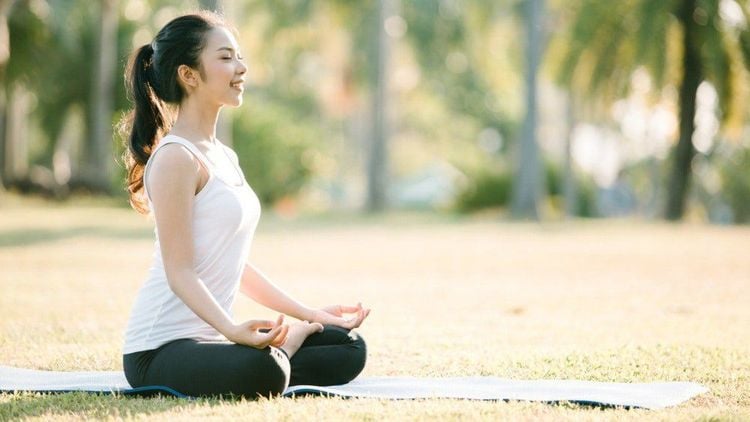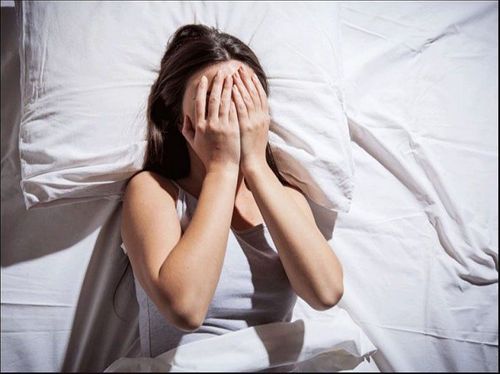This is an automatically translated article.
A good night's sleep is extremely important for human health and spirit. A good night's sleep will help you have a relaxed mind, helping your brain to function properly. People with sleep disorders such as: Difficulty sleeping, insomnia, ... will affect many other parts of the body and brain. Here are 20 simple ways to fall asleep as quickly as possible.
1. Lower the room temperature
Body temperature will change when you go to sleep: Cool down when lying down and warm up when standing up. Room temperature that is too high can make it difficult to sleep. Therefore, set the room temperature to a cool between 60 – 67°F (15.6 – 19.4°C). Because everyone will like a different temperature, so you should choose a room temperature that is suitable for your body.
Hot baths or showers can also help accelerate the body's temperature changes. After a hot bath, your body cools down, which can send a signal to your brain that you're ready to go to sleep. Many studies show that taking a hot bath before bed can improve sleep efficiency and quality.
Trắc nghiệm: Bận rộn có ảnh hưởng đến sức khỏe của bạn không?
Cuộc sống hiện đại khiến chúng ta vì quá bận rộn mà quên chăm sóc sức khỏe cho chính mình. Ai cũng biết rằng lịch trình làm việc cả ngày có thể khiến bạn kiệt sức, nhưng cụ thể bận rộn ảnh hưởng thế nào tới sức khỏe? Hãy cùng làm thử bài trắc nghiệm dưới đây.
2. Use 4-7-8 . breathing method
This is a method that is researched and developed on a simple airway, but has the effect of reducing stress and helping to relax before going to bed.
This method is based on breath control techniques from yoga to bring relaxation to the nervous system. Here are the steps to perform the 4-7-8 breathing method:
When doing this method, you need to lie down on the bed, moving your tongue to the back of your upper teeth. Breathe through your mouth as hard as you can. Continue to breathe gently through your nose. During that process, mentally count from 1 to 4. Maintain the breath and count to 7. Repeat the above process again and exhale through the mouth for 8 seconds. Continue to do the above 3 times to be able to complete 4 breaths.

3. Schedule a bedtime
Many people find that setting a sleep schedule makes it easier for them to fall asleep. Everyone's body has its own biological clock. This clock signals the body to feel awake during the day but sleepy at night.
You will have a regular biological clock if you have a routine of living, resting and waking up at the same time every day. Once your body has adapted to this schedule, it will make it easier for you to fall asleep and wake up at the same time each day.
Each adult should get enough sleep from 7 to 9 hours a night to ensure health. Moreover, you should give yourself 30 - 45 minutes to relax in the evening before going to bed.
4. Absorb light both day and night
Light can affect the circadian clock, which regulates sleep and alertness. Limiting exposure to light can lead to disruptions in circadian rhythms that make it difficult to fall asleep and lead to lack of alertness.
During the day, when the body is exposed to sunlight, it will help the body stay awake. Both natural daylight and artificial light have an effect on your alertness.
At night, darkness can make you feel sleepy due to the production of the hormone melatonin. In fact, the body secretes very little melatonin during the day.
5. Yoga, meditation
Stress can make it difficult to fall asleep. Therefore, meditation and yoga are tools to help calm the mind, relax the body and improve sleep quality.
Yoga movements will help you practice flexible breathing and body movements, bring mental tranquility, relieve stress. This method can also have a positive effect on sleep parameters such as sleep quality, efficiency and duration. Like yoga, maintaining a meditation routine will help you sleep better.

6. Avoid looking at the clock
Many people wake up at night and they worry it could be a sign of a medical condition. However, not being able to fall back asleep can disrupt your good night's sleep. People who wake up in the middle of the night tend to look at their clocks and obsess about their inability to fall back asleep.
Worse yet, waking up frequently without getting back to sleep can cause the body to form a habit of waking up in the middle of the night every night. If possible, it is best to install the clock outside of your room. If you need an alarm, you can turn the clock and avoid watching when you wake up in the middle of the night.
7. Avoid napping during the day
Due to not sleeping well at night, many people with insomnia often have a habit of falling asleep during the day. While short naps are associated with improved alertness, it can negatively impact nighttime sleep.
8. Food can adversely affect sleep quality
Consuming food before going to bed can affect the quality of sleep. High-carb meals can make it harder to sleep well. Many studies show that a high-carb diet can help you fall asleep faster, but it is not a good night's sleep. Instead, high-fat foods can promote a deeper and more comfortable sleep.
If you still want to eat a carb-rich meal for dinner, eat it at least 4 hours before bed to give your body enough time to digest.
9. Listen to relaxing music
Music can significantly improve sleep quality, and can even be used to improve chronic sleep disorders. A study of 24 young adults demonstrated that music promotes deeper sleep.
10. Exercise during the day
Regular exercise is not only beneficial to health, but it also helps increase the duration and quality of sleep by promoting serotonin production in the brain and reducing levels of cortisol, the stress hormone. However, it's important that you maintain a moderate-intensity exercise routine. High-intensity, over-exercising can lead to insomnia.
The choice of time to practice is also very important. You should exercise more in the morning and limit exercise at the end of the day. Some activities are aimed at training such as:
Jogging. Walk. Cycling. Tennis.
11. Choose a comfortable mattress
Comfortable mattress and bedding can have an effect on the depth and quality of sleep. You should choose a mattress with medium firmness for better sleep quality and prevention of sleep disturbances.
The quality of the pillow is also very important. It has the ability to determine the comfort and the neck curve. One small study determined that orthopedic pillows were better for sleep quality than feather or foam pillows.
Finally, the fabric of your sleepwear can affect sleep. It's best to choose clothes that are comfortable, stretchy, and absorbent.
12. Stay away from electronic devices before going to bed
One of the causes of insomnia is exposure to electronic devices. Watching TV, playing video games, using cell phones, and social media can make it difficult to fall asleep. This is because the blue light emitted by these devices suppresses melatonin production.
Therefore, you should disconnect all electronic devices such as: Computers, mobile phones, ... before going to bed.
13. Use essential oils
Essential oils have a relaxing effect, relieve stress, ... will help improve sleep in both quality and sleep time. Popular scents that have a positive effect on sleep include:
Lavender. Brocade rose. Mint. Combine lemon and orange essences.
14. Write before bed
Many people find it difficult to sleep when thoughts keep running around in their mind. This can cause anxiety and stress, create negative emotions, and disturb sleep. Therefore, psychologists recommend keeping a journal and focusing on positive thoughts to calm your mind. This will make it easier for you to fall asleep.
15. Limit caffeine intake
Caffeine works against fatigue and stimulates alertness. It can be found in foods and beverages such as: Chocolate, coffee, soft drinks, energy drinks, etc. This stimulant can potentially negatively affect quality and duration. amount of sleep.
Although the effects of caffeine vary from person to person, you should limit caffeine consumption at least 6 hours before bedtime. Instead, you should drink a soothing tea like chamomile tea to promote sleep and relaxation.

16. Adjust your sleeping position
Good sleep quality may depend on your sleeping position. Normally, there are three main sleeping positions: prone, side, and back.
Many people believe that sleeping on your back will help you get better quality sleep. However, research has shown that this is not the best sleeping position. Because it can lead to airway obstruction, sleep apnea, and snoring.
17. Read books, magazines,...
Read anything before going to bed like: Reading books, magazines, ... can help you sleep better. Especially for children, reading before bed can promote longer sleep. However, it is important for you to understand the difference between reading an e-book and a traditional paper book.
E-books emit blue light that reduces melatonin secretion. Low melatonin levels make it difficult to fall asleep and leave you feeling tired the next day. Therefore, you should read paper books to relax and improve your sleep.
18. Try to stay awake
Many people believe that, when you try to force yourself to sleep, it will help you fall asleep more easily. However, psychologists say this is a misconception. Instead, you should only go to bed when you feel really sleepy.
19. Imagine the things that make you happy
Instead of lying in bed worrying and thinking about stressful things, visualize positive things. In one study on insomnia, participants were able to fall asleep faster after they were instructed to use visual distractions.
This technique helped them occupy their mind with good thoughts instead of being busy with worries in the time before sleeping.
20. Use sleep-enhancing supplements
Magnesium Magnesium helps activate the neurotransmitters responsible for sleep. Doses of up to 500 milligrams (mg) per day have been shown to improve sleep.
5-HTP (5-hydroxytryptophan) The amino acid 5-HTP enhances serotonin production which has a sleep-regulating effect. You can use doses up to 600 mg per day, taken once daily or in divided doses to be effective in treating insomnia.
Melatonin Melatonin can be produced naturally by the body. However, this substance can also be supplemented through pills to regulate sleep. Using a dose of 0.5–5mg, taken 2 hours before bedtime can improve sleep quality.
L - theanine This is an amino acid that improves sleep quality and is very safe. You may be given a dose of 400mg per day.
GABA (gamma-aminobutyric acid) Gamma-aminobutyric acid is a compound produced to inhibit certain transmitters and may help the central nervous system relax.
In short, sleep loss can make you feel tired the next morning, affecting your health and concentration. Having trouble falling asleep is not only frustrating, but it can also affect your mental and physical health. You can apply one or more of the above measures to improve the quality of your sleep.
Please follow the website: Vinmec.com regularly to update many other useful information.
Please dial HOTLINE for more information or register for an appointment HERE. Download MyVinmec app to make appointments faster and to manage your bookings easily.
Reference source: healthline.com












